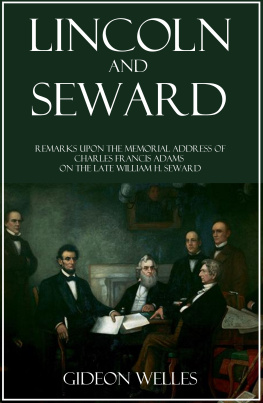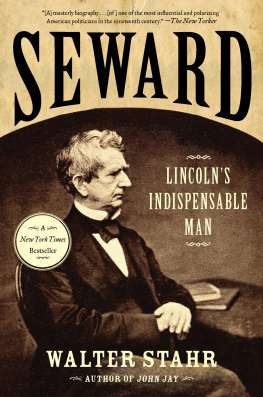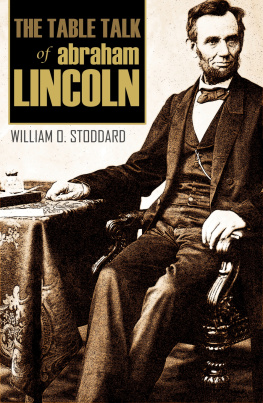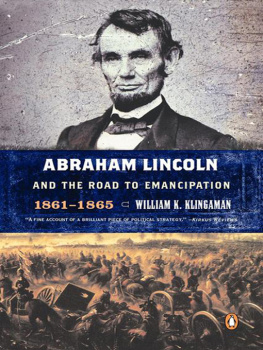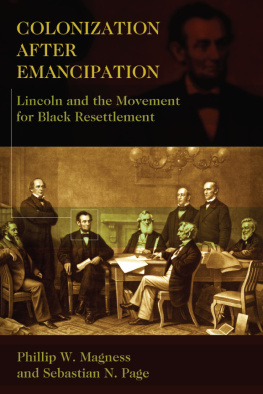Gideon Welles - Lincoln and Seward
Here you can read online Gideon Welles - Lincoln and Seward full text of the book (entire story) in english for free. Download pdf and epub, get meaning, cover and reviews about this ebook. year: 2014, publisher: BIG BYTE BOOKS, genre: Science. Description of the work, (preface) as well as reviews are available. Best literature library LitArk.com created for fans of good reading and offers a wide selection of genres:
Romance novel
Science fiction
Adventure
Detective
Science
History
Home and family
Prose
Art
Politics
Computer
Non-fiction
Religion
Business
Children
Humor
Choose a favorite category and find really read worthwhile books. Enjoy immersion in the world of imagination, feel the emotions of the characters or learn something new for yourself, make an fascinating discovery.
- Book:Lincoln and Seward
- Author:
- Publisher:BIG BYTE BOOKS
- Genre:
- Year:2014
- Rating:5 / 5
- Favourites:Add to favourites
- Your mark:
- 100
- 1
- 2
- 3
- 4
- 5
Lincoln and Seward: summary, description and annotation
We offer to read an annotation, description, summary or preface (depends on what the author of the book "Lincoln and Seward" wrote himself). If you haven't found the necessary information about the book — write in the comments, we will try to find it.
Who was the force behind emancipation in the Lincoln administration? In this brief address, Gideon Welles, Lincolns Navy Secretary, takes exception to remarks given by Charles Adams at the memorial for the late William Seward, Lincolns Secretary of State. From an insiders perspective, Welles provides a look at how he observed the evolution of Lincolns thinking and the direction of his administration.
Gideon Welles: author's other books
Who wrote Lincoln and Seward? Find out the surname, the name of the author of the book and a list of all author's works by series.
Lincoln and Seward — read online for free the complete book (whole text) full work
Below is the text of the book, divided by pages. System saving the place of the last page read, allows you to conveniently read the book "Lincoln and Seward" online for free, without having to search again every time where you left off. Put a bookmark, and you can go to the page where you finished reading at any time.
Font size:
Interval:
Bookmark:

MR. LINCOLN
AND MR. SEWARD.
BY GIDEON WELLES, LATE SECRETARY OF THE NAVY IN THE LINCOLN ADMINISTRATION
1873
2014 Get more great reading from BIG BYTE BOOKS
R EMARKS UPON THE M EMORIAL A DDRESS OF C HARLES F RANCIS A DAMS ON THE LATE W ILLIAM H. S EWARD .
DIFFERENCES existed in the Cabinet and the country in 1861 on some of the measures and the course of policy which the Government should pursue toward the secessionists. The questions presented were in some respects novel and without precedent, as was the insurrection itself. Hostilities were precipitated within forty days of the inauguration, before the Administration was fully established in place, or had time to develop its policy. The assault on the flag at Charleston compelled immediate action. The proclamation promptly issued for seventy-five thousand volunteers also declared a blockade of the Southern ports. There was entire unanimity in the Cabinet on all points in the proclamation except that of a blockade, which was questioned us a doubtful and irregular proceeding; for the conflict, whether an insurrection or rebellion, was purely domestica civil war and not a foreign war; and it was thought the internal dissensions in our own territory should be confined within our own borders. A majority of the Cabinet, therefore, preferred an embargo or suspension of intercourse with that part of the country to a blockade, and maintained it tube the true policy of the Government to close the ports and interdict commerce with the insurgents until the rebellion was suppressed. It was claimed that a blockade was not a domestic but an international questionlegitimate and proper as between two distinct nations, but that we could not properly blockade our own ports, though we might shut them up, prohibit traffic from abroad by law, and make its violation a criminal offence; that the very fact of a blockade of the whole rebel territory would raise them to the level of belligerentsa concession to the Confederate organization virtually admitting it to be a quasi-government giving that organization a position among nations that we would not and could not recognize or sanction, and which would
inevitably lead to embarrassments. But the subject was in some of its aspect* novel, and the Secretary of State, though sometimes rash, had not the bold and vigorous mind to assert and maintain a right principle if fraught with doubt and difficulty, provided there was an easier path. The blockade, he thought, opened up a way. The questions of blockade were well settled and clearly defined, the authority and precedents explicit; and he therefore preferred to adopt that course, shelter himself under those precedents, and apply international law to a strictly national and domestic controversy, rather than assert a measure and vindicate an important principle affecting national rights. Less was said in the confusion and proceedings which came like an avalanche at that critical moment upon the Administration, than at a later period. Two members of the Cabinet said they bad bestowed very slight examination upon the subject, and as it related to foreign intercourse they deferred to the Secretary of State, who had given it special attention, and also cited authorities justifying an exclusion of commerce from national ports in the equitable farm of blockade. President Lincoln inclined to that view, and when Mr. Seward asserted that one great object of the blockade instead of a closure of the ports was to avoid complications which would he likely to involve us in a foreign war, the question was decided. The President said we could not afford to have two wars on our hands at once, and a blockade was ordered. The authority and the right of the national Government to close ports within its jurisdiction was controverted by no one, though a blockade was. Mr. Seward himself, in his despatch of the Nth of Jane to Mr. Adams, said: We claim to have a right to close the ports which have been seized by insurrectionists for the purpose of suppressing the attempted revolution, and no one could justly complain if we had done so decisively and peremptorily.
But the English Government, as soon as information was obtained of differences in the American Cabinet, made haste to force ns to adhere to the blockade, which would be an acknowledgment of belligerent rights to the rebels, by indirectly admonishing us of its views and intentions in a debate promptly got up in Parliament for the purpose on the 27th of June, immediately on the receipt of Mr. Sewards despatch. Lord John Russell in that debate announced the interpolation of a new doctrine by the British Government into international law, by declaring to the feeble government of New Granada, It is not competent for its government to close its ports that are de facto in possession of the insurgents.
The debate, ostensibly on the affairs of New Granada, was evidently and unmistakably intended as an admonition and menace to the United States, then engaged in suppressing insurrection. In a despatch of the 28th of June from our Minister in London, just twenty days after Mr. Seward's despatch of the 8th of June claiming our right to close the ports, Mr. Adams wrote the Secretary of State that in an interview with Lord John Russell, His Lordship then said something about difficulties in New Granada, and the intelligence that the insurgents had undertaken to close several of their ports. But the law officers here told him that this could not be done as against foreign nations, excepting by the regular form of blockade. He did not know what we thought about it, but he had observed that some such plan was likely to be adopted at the coming session of Congress in regard to the ports of those whom we considered as insurgents. His lordship also on the 27th of June announced in Parliament that the opinion of Her Majestys Government after taking legal advice is, that it is perfectly competent for the government of a country in a state of tranquillity to say which ports shall be open to trade and which shall be closed; but in the event of insurrection or civil war in that country, it is not competent for its government to close its ports that are de facto in the hands of the insurgents, as that would be an invasion of international law with regard to blockade.
Congress when it convened in special session in July, a few days after this English menace, totally unmindful of the opinion of Her Majestys Government after taking legal advice, but under the counsel and deliberate conclusion of our wisest and ablest legislators and statesmen, and in total disregard of the policy of our own Secretary of State as well as of Her Majestys Government, declined to commit itself to the blockade, and in explicit and emphatic language authorized, by the act of the 13th of July, a closure of the ports. Mr. Seward was constrained, under these circumstances and under the direction of President Lincoln, on the 21st of July, to tell Mr. Adams that Since your conversation with Lord John Russell, the Congress of the United States has by law asserted the right of this Government to close the ports of this country which have been seized by the insurgents. The connecting by Lord John Russell of that measure when it was in prospect with what had taken place in regard to a law of New Granada, gives to the remarks which he made to you a significance that requires no especial illustration. The President fully agrees with Congress in the principle of the law which authorizes him to close the ports which have been seized by the insurgents, and he will put into execution and maintain it with all the means at his command, at the hazard of whatever consequences, whenever it shall appear that the safety of the nation requires it.
Next pageFont size:
Interval:
Bookmark:
Similar books «Lincoln and Seward»
Look at similar books to Lincoln and Seward. We have selected literature similar in name and meaning in the hope of providing readers with more options to find new, interesting, not yet read works.
Discussion, reviews of the book Lincoln and Seward and just readers' own opinions. Leave your comments, write what you think about the work, its meaning or the main characters. Specify what exactly you liked and what you didn't like, and why you think so.

